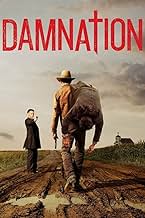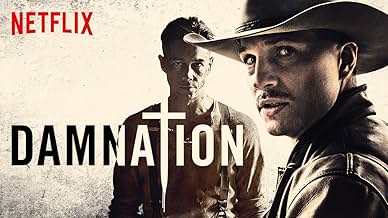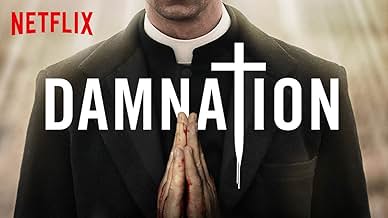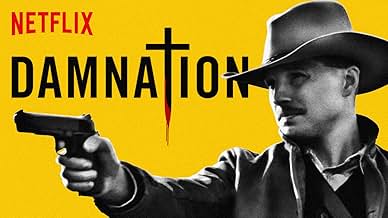Una saga epica ambientata nell'America degli anni 30, incentrata sul conflitto tra ricchi e poveri.Una saga epica ambientata nell'America degli anni 30, incentrata sul conflitto tra ricchi e poveri.Una saga epica ambientata nell'America degli anni 30, incentrata sul conflitto tra ricchi e poveri.
- Premi
- 1 vittoria e 5 candidature totali
Sfoglia gli episodi
Recensioni in evidenza
Wish Netflix would order another season. I'm hooked just to find out it was cancelled.
I've really enjoyed the first two episodes. The cast is attractive, can act and the script is well done. The premise of the rich vs the poor is fitting in the current time of our country. There is enough action to keep it exciting, plenty of questions that need answering and enough drama to keep you watching.
I binge watched Damnation during lockdown and thoroughly enjoyed it. I can't believe it passed me by when first released, but then lockdown has given most of us a bit more time on our hands. The first couple of episodes were a little slow, which is why I gave it 9 stars. However, the storyline and action ramped up after this making Damnation an action packed series. The acting was top notch, especially the brothers, Seth and Creeley. I really hope Netflix commissions another series.
If you liked "Deadwood" you might like "Damnation." Both "Damnation" and "Deadwood" are about power politics and corruption in western settings, "Deadwood" being set in the 19th Century Gilded Age in South Dakota, "Damnation" set in rural Iowa during the Great Depression (1931). FYI, the writers and director of "Damnation" have worked on projects like "Longmire" and "Office Space." The writing is well done (if brutal), and the acting excellent. Filmed in Calgary, Alberta, the scenery passes well enough for some parts of Iowa.
One of the differences between the two series is that "Damnation" is, while set in the past, deliberately intends to comment on our current state of affairs in the early 21st Century. The 1930's, like our time now, was a time when the economy failed millions, institutions such as the press, law enforcement and the courts appeared to have been corrupted, and the answers to these problems seemed they could only be solved by revolutions either by the extreme right or the extreme left. The comparisons can be taken a little far: one character, representing the "Big Business" interests coming after the small farmers, reveals that the interests he represents wants to eventually kick the farmers off their land to not only mechanize agriculture, but also mechanize factories and warfare (I think with our fears of Artificial Intelligence, this is more a fear of our time than the 1930's).
Another difference between "Deadwood" and "Damnation" is that the ruthless business interests are actively being opposed. The farmers are attempting to unionize and strike to protect themselves (though two of the main characters, who are the main labor organizers, would likely really prefer a workers revolution). Also, media like the investigative press and radio may also end up playing part in opposing "Big Business" and their enforcers. So far however, the local paper in "Damnation" is covering up the attempt to drive the small farmers off their land by price fixing and violence by strikebreakers.
The USA Network provides excellent video interviews with the director and writers, who make clear this is their intent. "To understand the present, go back to the past," one of the writers says, or that the series, while set in the 1930's "Mirrors the Past (director Adam Kane)." USA also provides a couple of good mini-documentaries "Legacy of the Heartland: The One Thousand" and "Legacy of the Heartland: War of Words." The documentaries and the interviews put the characters and the action in better context, and really make this interesting, well thought out series more understandable.
One of the differences between the two series is that "Damnation" is, while set in the past, deliberately intends to comment on our current state of affairs in the early 21st Century. The 1930's, like our time now, was a time when the economy failed millions, institutions such as the press, law enforcement and the courts appeared to have been corrupted, and the answers to these problems seemed they could only be solved by revolutions either by the extreme right or the extreme left. The comparisons can be taken a little far: one character, representing the "Big Business" interests coming after the small farmers, reveals that the interests he represents wants to eventually kick the farmers off their land to not only mechanize agriculture, but also mechanize factories and warfare (I think with our fears of Artificial Intelligence, this is more a fear of our time than the 1930's).
Another difference between "Deadwood" and "Damnation" is that the ruthless business interests are actively being opposed. The farmers are attempting to unionize and strike to protect themselves (though two of the main characters, who are the main labor organizers, would likely really prefer a workers revolution). Also, media like the investigative press and radio may also end up playing part in opposing "Big Business" and their enforcers. So far however, the local paper in "Damnation" is covering up the attempt to drive the small farmers off their land by price fixing and violence by strikebreakers.
The USA Network provides excellent video interviews with the director and writers, who make clear this is their intent. "To understand the present, go back to the past," one of the writers says, or that the series, while set in the 1930's "Mirrors the Past (director Adam Kane)." USA also provides a couple of good mini-documentaries "Legacy of the Heartland: The One Thousand" and "Legacy of the Heartland: War of Words." The documentaries and the interviews put the characters and the action in better context, and really make this interesting, well thought out series more understandable.
Really enjoyed the first season, it was one of those shows that really grows on you. Now at the end of the first season I'm hungry for more, please keep this awesome TV show alive!
Lo sapevi?
- QuizWas originally titled "Dark Wind," but was changed to "Damnation" to fit the show's theme and tone.
I più visti
Accedi per valutare e creare un elenco di titoli salvati per ottenere consigli personalizzati
- How many seasons does Damnation have?Powered by Alexa
Dettagli
Contribuisci a questa pagina
Suggerisci una modifica o aggiungi i contenuti mancanti

Divario superiore
What was the official certification given to Damnation (2017) in Australia?
Rispondi






































